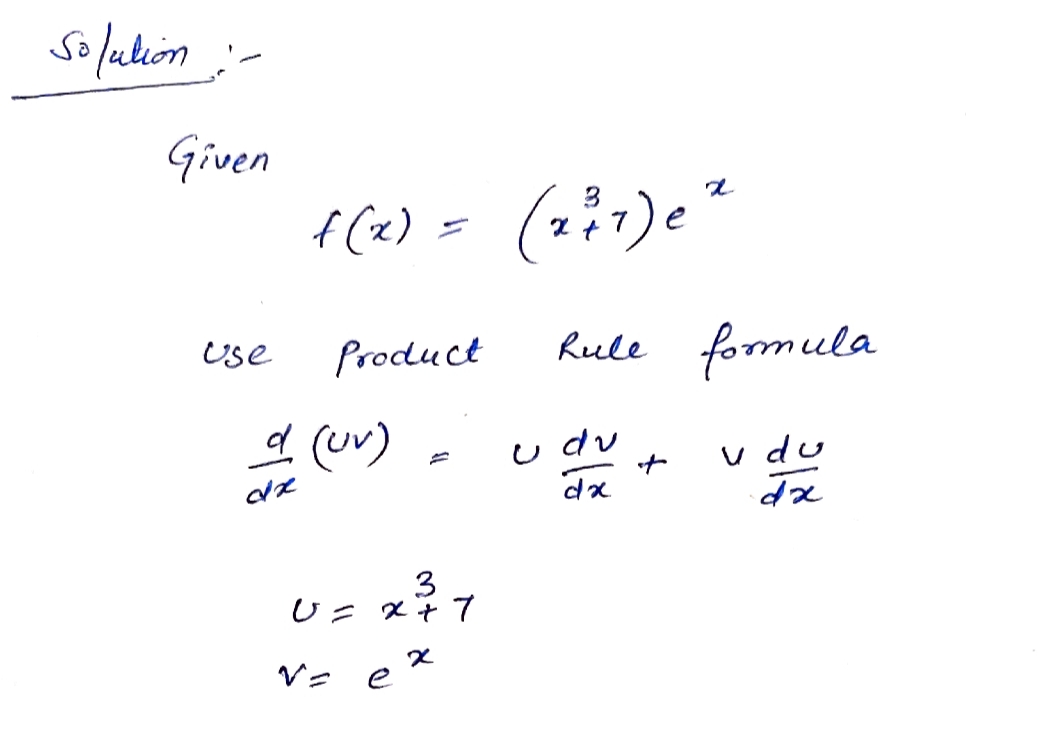Calculus: Early Transcendentals
8th Edition
ISBN:9781285741550
Author:James Stewart
Publisher:James Stewart
Chapter1: Functions And Models
Section: Chapter Questions
Problem 1RCC: (a) What is a function? What are its domain and range? (b) What is the graph of a function? (c) How...
Related questions
Question
3.2 help pls
![**Problem Statement:**
Find \( f'(x) \) and \( f''(x) \).
Given:
\[ f(x) = (x^3 + 7)e^x \]
**Solution:**
To solve this problem, we need to find the first and second derivatives of the function \( f(x) \).
### Steps to Solve:
1. **First Derivative \((f'(x))\):**
- Use the product rule for differentiation, which states that if you have a function in the form of \( u(x) \cdot v(x) \), then:
\[
\frac{d}{dx}[u(x) \cdot v(x)] = u'(x) \cdot v(x) + u(x) \cdot v'(x)
\]
- Let \( u(x) = x^3 + 7 \) and \( v(x) = e^x \).
- Differentiate \( u(x) \) and \( v(x) \):
\[
u'(x) = 3x^2
\]
\[
v'(x) = e^x
\]
- Apply the product rule:
\[
f'(x) = (3x^2)(e^x) + (x^3 + 7)(e^x)
\]
2. **Second Derivative \((f''(x))\):**
- Differentiate \( f'(x) \) using the product and sum rules.
- The expression for \( f'(x) \) is:
\[
f'(x) = (3x^2 e^x) + (x^3 + 7)e^x
\]
- Differentiate each part separately using the product rule again.
- Sum the results to find \( f''(x) \).
**Note:**
- For clarity and understanding, each derivative step usually involves expanding and simplifying the expression.
- Detailed calculations will help confirm the correctness of derivatives.
This problem helps in understanding the application of differentiation rules, particularly the product rule, in finding higher-order derivatives.](/v2/_next/image?url=https%3A%2F%2Fcontent.bartleby.com%2Fqna-images%2Fquestion%2Fd87a6c27-4db9-4e59-bfbc-0dc374c6a02c%2F158989e2-618b-4918-96bb-e65fded31307%2Ffrc6txr_processed.jpeg&w=3840&q=75)
Transcribed Image Text:**Problem Statement:**
Find \( f'(x) \) and \( f''(x) \).
Given:
\[ f(x) = (x^3 + 7)e^x \]
**Solution:**
To solve this problem, we need to find the first and second derivatives of the function \( f(x) \).
### Steps to Solve:
1. **First Derivative \((f'(x))\):**
- Use the product rule for differentiation, which states that if you have a function in the form of \( u(x) \cdot v(x) \), then:
\[
\frac{d}{dx}[u(x) \cdot v(x)] = u'(x) \cdot v(x) + u(x) \cdot v'(x)
\]
- Let \( u(x) = x^3 + 7 \) and \( v(x) = e^x \).
- Differentiate \( u(x) \) and \( v(x) \):
\[
u'(x) = 3x^2
\]
\[
v'(x) = e^x
\]
- Apply the product rule:
\[
f'(x) = (3x^2)(e^x) + (x^3 + 7)(e^x)
\]
2. **Second Derivative \((f''(x))\):**
- Differentiate \( f'(x) \) using the product and sum rules.
- The expression for \( f'(x) \) is:
\[
f'(x) = (3x^2 e^x) + (x^3 + 7)e^x
\]
- Differentiate each part separately using the product rule again.
- Sum the results to find \( f''(x) \).
**Note:**
- For clarity and understanding, each derivative step usually involves expanding and simplifying the expression.
- Detailed calculations will help confirm the correctness of derivatives.
This problem helps in understanding the application of differentiation rules, particularly the product rule, in finding higher-order derivatives.
Expert Solution
Step 1: Define the product rule

Step by step
Solved in 3 steps with 3 images

Recommended textbooks for you

Calculus: Early Transcendentals
Calculus
ISBN:
9781285741550
Author:
James Stewart
Publisher:
Cengage Learning

Thomas' Calculus (14th Edition)
Calculus
ISBN:
9780134438986
Author:
Joel R. Hass, Christopher E. Heil, Maurice D. Weir
Publisher:
PEARSON

Calculus: Early Transcendentals (3rd Edition)
Calculus
ISBN:
9780134763644
Author:
William L. Briggs, Lyle Cochran, Bernard Gillett, Eric Schulz
Publisher:
PEARSON

Calculus: Early Transcendentals
Calculus
ISBN:
9781285741550
Author:
James Stewart
Publisher:
Cengage Learning

Thomas' Calculus (14th Edition)
Calculus
ISBN:
9780134438986
Author:
Joel R. Hass, Christopher E. Heil, Maurice D. Weir
Publisher:
PEARSON

Calculus: Early Transcendentals (3rd Edition)
Calculus
ISBN:
9780134763644
Author:
William L. Briggs, Lyle Cochran, Bernard Gillett, Eric Schulz
Publisher:
PEARSON

Calculus: Early Transcendentals
Calculus
ISBN:
9781319050740
Author:
Jon Rogawski, Colin Adams, Robert Franzosa
Publisher:
W. H. Freeman


Calculus: Early Transcendental Functions
Calculus
ISBN:
9781337552516
Author:
Ron Larson, Bruce H. Edwards
Publisher:
Cengage Learning